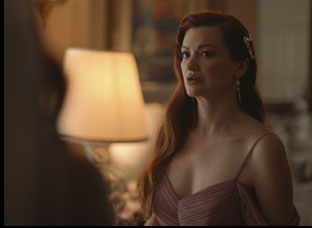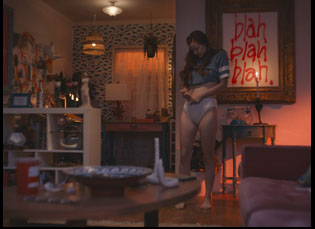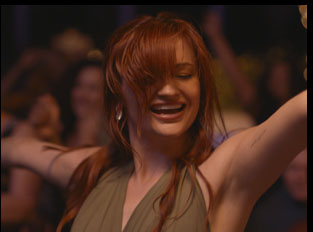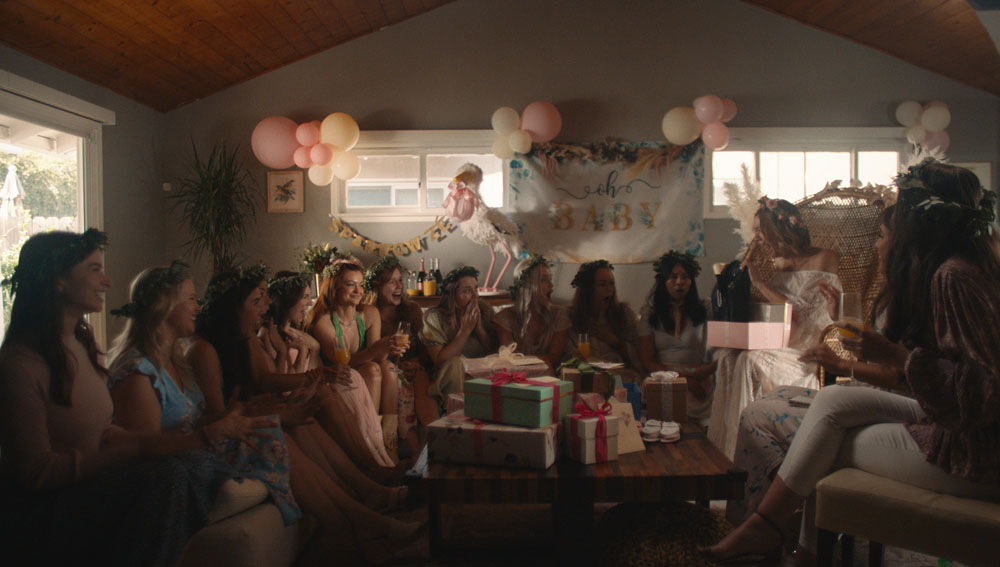Writing has always gotten Leah McKendrick out of a jam. As an actress looking for her big break amidst the bit parts she was offered to play a waitress or crime victim #3 on TV shows and movies, McKendrick decided that staring at a blank page might suit her better than staring out into the abyss, eventually willing to life the 2017 feature “M.F.A.” in which she would write herself the part that would guarantee some screen time as the neighbor of a college student (Francesca Eastwood) in need of a little encouragement to report an assault that’s happened to her. It was a supporting role that may have been an opportunity for casting directors to take notice, but given the fearless nature of the screenplay itself in which revenge becomes the only satisfying option for the aggrieved art school student, producers couldn’t help but see McKendrick to be a force to be reckoned as far as writing dialogue beyond reciting it and a steady stream of studio jobs have come her way, with plans to put new spins on “Troop Beverly Hills” and “I Know What You Did Last Summer.”
If putting a pen to paper changed McKendrick’s career trajectory, it also may have changed her life in an entirely different way when her notebook became a refuge as she went through the difficult experience of freezing her eggs. If tragedy and comedy live side by side, McKendrick is now sharing the good humor that pulled her through the physically and emotionally taxing time in “Scrambled,” which not only gives her the juicy lead she’s always craved as an actress, but sees her seizing another key role with great gusto in what is her feature directorial debut. Both behind the camera and in front of it, McKendrick can be seen taking bold risks as she tells of Nellie, a party girl who has started to tire of being asked if she has a little Molly by her friends and upon attending the wedding of her bestie (Ego Nwodim) has some sense slapped into her by a fellow guest (June Diane Raphael) who assures her that she’s in for a rude surprise if she truly believes her “thirties are just your twenties with money.”
While Nellie’s Etsy business doesn’t promise the big bucks, the pressure is on her in other ways as her father (Clancy Brown) presses for grandchildren and it seems as if every one of her friends are either having babies or warning that her biological clock is ticking, leading her to put herself through a hell she doesn’t entirely know why she’s enduring with cryopreservation, though thinking towards the future allows her to reflect on all the ways in which she wouldn’t want the past to repeat itself, eventually calling upon old boyfriends to revisit relationships that were as uncomfortable as anything she’s going through now. McKendrick’s incandescent glow as Nellie makes any thought of her ever being laid low pretty devastating, but “Scrambled,” with its punchy dialogue and searing self-reflection, reveals that the rough road only leads to something stronger both in terms of its story and the actress/writer/director’s willingness to turn her fears into a fierce introduction as a filmmaker.
After becoming the talk of SXSW last year at its premiere, “Scrambled” is opening in theaters across the country this week and McKendrick spoke about perhaps waiting to decide if she wants to become a mother, but sending her baby out into the world as a director and protecting it at all costs, resulting in a film that’s so authentically and unapologetically hers.

The honest truth is — and I hate to say this — I am directing in order to protect my scripts. And I am coming at it backwards, but I have seen so many of my scripts change so much and work through an inefficient studio system at times. The process of development can be both beautiful, incredible, and challenging, but also completely soul-sucking and heartbreaking. And this movie, I just felt too attached to. The story was my own, and I felt like I wouldn’t be able to survive in a world where I handed it over to somebody else to birth. This is about my family. This is about me. This is about women. And this was the movie that I wanted when I was bloated on my couch, freezing my eggs myself. So I couldn’t give it up for adoption.
Also, it was out of efficiency because I know how long it can take to attach a director. You’re luring them and they have ideas and they should. It’s a collaborative medium and they’re entitled to change it how they believe, but I thought I’m going to be that director and be the one to change it if I see fit. And then I kind of loved it. I’m drunk with power now. [laughs] So now I can’t go back. I can’t give any of my scripts away.
I’m glad to hear it because you’re good at it. And protecting the script has another meaning for this film when as you mentioned, you were writing it as you were actually experiencing what you ended up with in the film. Throughout the process where there’s rewrites and such, did you want to stay true to those raw feelings you had in the moment?
I’m going to tell you a secret, and I’m not proud of this, but I wrote the script and I said, “I’m not taking notes.” Which is a douchey thing to do, and I did ultimately end up taking a few notes from very select [few]. My agents had a couple great notes and my producers had a couple great notes. But I had just had a couple films killed by a studio and I had been through development over many years, so I feel like I write scripts for free, but you pay me to take your notes. That is what I feel like I do for a living. And I just really felt I trust my version of this because I lived it. I don’t want to slip into development where what I have learned as a writer is there’s many versions of “Scrambled” and there’s no wrong way. Everybody has a different vision, but I have to stay true to my vision and what I lived, so my producers knew that I was holding onto it and I was like, “Step away, step away, step away. I’m not taking anybody’s notes.” And everybody was really gentle with me. I will say that this was probably the script that I have taken the least notes on ever.
Not only because it’s your personal experience, but it’s really distinctive in how it’s structured – you’re on your own and throughout, there’s other people that come into the mix, but you really feel like it’s no one person and there’s this cultural opposition you’re facing. Was that tough to develop?
That’s so funny — another filmmaker pointed out there’s no bad guy and how interesting to make a movie where society is the antagonist and the dad is a [little] representative of that, but there’s no real villain here. And structurally, I didn’t state the theme on page five or hit the midpoint on page 55. I didn’t do the typical things that I tend to do on my assignments. And I think that was me knowing that I wasn’t selling my script, that I was going to go straight into production over the summer for $5 if I had to. I was going to shoot it my way, shoestring [style] the way I used to make my work. And it was very freeing and liberating to go, “Well, they’re probably going to note me that the midpoint needs to [happen here] because I already said “I’m not taking any notes.” [laughs]

Yeah, I don’t know how you shoot “Arrival” and you’re Amy Adams and you’re directing [too], I don’t know how you would do that. [laughs] You’re just diving in and the world is at war and there’s aliens. But something [like “Scrambled”] that you know so intimately because you lived it, there’s just this deep, deep understanding [where] it’s in your bones. You get it, so that was my saving grace in a lot of ways. I didn’t need to dissect the scene as a director emotionally, because I lived the scene, so I could say to my actors, “Let’s just talk about this and I’m going to tell you what actually happened, but we can find our own version of this and you can use that or throw that out.” A lot of times they would go, “Oh, that’s interesting,” and then adjust it just so that it was still fresh and still new.
There were a couple moments while shooting that I would grab Jillian, my producer, and cry for a moment because it felt so real. And at times, I was probably very exhausted and not on a lot of sleep and the the film and my real life would start to blur because it’s all I’m doing. There were a couple moments where I felt like I was right back freezing my eggs again and feeling that loneliness and isolation, but that probably meant I was onto something in those moments, that we were creating a container for me to be able to revisit.
Was there anything that happened that you may not have expected during shooting, but could embrace?
Constantly, constantly. You don’t know what an actor’s going do. That slap, that June [Diane Raphael] gives me when she says, “How old are you, 32, 33?” — that wasn’t in the script. She doesn’t know what she’s going to do that. She’s a wild woman and you just need to trust somebody as brilliant as June, or [Andrew] Santino, or Clancy [Brown] or Ego [Nwodim], all my actors. The beauty is that they elevate the material. Or my cinematographer [Julia Swain] — my film was not supposed to look as beautiful and colorful as it does. That’s her skill set. If it had been only what I had in my head, it would have looked very drab, so I’m so grateful that the really creative decision that I made [for “Scrambled”] was pulling together a team of more talented people than me.
Everyone had their kingdom within “Scrambled,” and I told everybody, “The script is the script and it’s just a blueprint. Don’t forget about the script, but let’s just play and find it,” so I never knew what I was going to get. And there are some moments that feel eerily similar to the real life experience and those were the times that really got me because you’re almost unprepared for that. You’re more prepared for the fresh version, the remix. But when you get something that feels really authentic, it’s scary and it took my breath away in moments. The whole movie is a heightened version of what happened and a heightened version of me and a heightened version of the people that I love, so it’s a completely new iteration of my life, but I’m proud of it.

One thing that I learned about myself — I like to have five endings, and this is where you probably need to take some notes, Leah McKendrick. [laughs] So my producers Brett [Haley] and Gillian [Bohrer] were like, “We’ve got to move the dance sequence to over credits. People get it.” And they won that fight, and I agree with them. But yes, a lot of those people that are dancing are friends of mine and that’s because we didn’t have the money to afford a lot of background performers. But I wanted to bookend the film with her having this bridesmaid entrance that goes awry [at the beginning of the movie], and it ends with her having this bridesmaid entrance [where] maybe you’re thinking she’s got a boyfriend, but no, she didn’t need a guy. She’s dancing on her own and has this new lease on life and we’re just gonna be dancing at the Pink Pony Club till the day we die. I just wanted to end with an empowerment and I love dancing in movies. [People are] always going make fun of me and call me basic, but just watch out. Every single movie I make is going to have a dance sequence — probably more than one.
“Scrambled” opens wide on February 2nd. You can see where it’s playing at a theater near you here.




